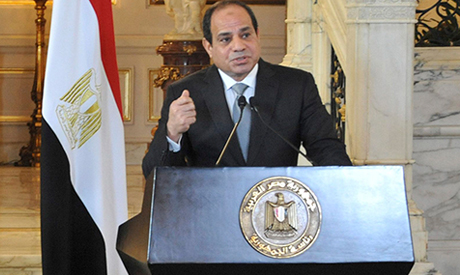Residential city to be built on 966 hectares near planned nuclear plant in Marsa Matrouh governorate

Egyptian President Abdel Fattah el-Sisi
The army will construct a new residential city near Egypt's first prospective nuclear plant, following a presidential decree on Tuesday.
President Abdel-Fattah El-Sisi has allocated 2,300 feddans (966 hectares) of land to the defence ministry to set up a residential area near the nuclear plant in Dabaa, Marsa Matrouh governorate on the Mediterranean coast, 240 kilometres west of Alexandria.
The new area is expected to house workers at the plant, currently under construction, and provide necessary services.
The nuclear plant will be used to generate power to meet the country's increasing electricity demands as blackouts have became recurrent over recent years due to fuel shortages.
The first brick in the project was laid under ousted president Hosni Mubarak. Site development was halted due to disputes with local residents, who accused the state of confiscating their land without proper compensation.
In January 2012, Dabaa locals stormed the construction site, destroying existing infrastructure and refusing to surrender to military police. Low radioactive sources were also looted from the location, according to the International Atomic Energy Agency.
In late 2013, local tribal families from Dabaa and Marsa Matrouh city relinquished the nuclear construction site to the Egyptian armed forces after months of occupying the controversial area.
In September, the authorities signed an agreement with the locals stipulating the provision of compensation for the local residents and guarranteeing them jobs at the plant.

Egyptian President Abdel Fattah el-Sisi
The army will construct a new residential city near Egypt's first prospective nuclear plant, following a presidential decree on Tuesday.
President Abdel-Fattah El-Sisi has allocated 2,300 feddans (966 hectares) of land to the defence ministry to set up a residential area near the nuclear plant in Dabaa, Marsa Matrouh governorate on the Mediterranean coast, 240 kilometres west of Alexandria.
The new area is expected to house workers at the plant, currently under construction, and provide necessary services.
The nuclear plant will be used to generate power to meet the country's increasing electricity demands as blackouts have became recurrent over recent years due to fuel shortages.
The first brick in the project was laid under ousted president Hosni Mubarak. Site development was halted due to disputes with local residents, who accused the state of confiscating their land without proper compensation.
In January 2012, Dabaa locals stormed the construction site, destroying existing infrastructure and refusing to surrender to military police. Low radioactive sources were also looted from the location, according to the International Atomic Energy Agency.
In late 2013, local tribal families from Dabaa and Marsa Matrouh city relinquished the nuclear construction site to the Egyptian armed forces after months of occupying the controversial area.
In September, the authorities signed an agreement with the locals stipulating the provision of compensation for the local residents and guarranteeing them jobs at the plant.

No comments:
Post a Comment
Note: Only a member of this blog may post a comment.